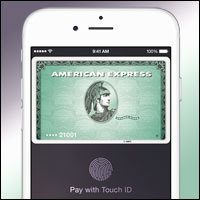
Shortly after Apple Pay’s Monday launch, some eager early users were unsettled to see duplicate charges on their accounts.
Apple Pay lets iPhone 6 or iPhone 6 Plus users store credit card information on their devices and then pay for products using tap-to-pay terminals in stores, or via apps when shopping online.
However, in some cases, it appears to be dinging consumers’ accounts twice. Because one of Apple Pay’s security features is that it keeps no transaction records, customers are finding themselves trying to convince their banks they are not responsible for duplicate charges without being able to produce any paperwork or backup data.
Some well-publicized cases were quickly resolved, but what about consumers who don’t have access to a high-profile news organization as a podium?
Doubly Dinged
CNN’s Samuel Burke experienced the problem and called Bank of America’s customer service to rectify it. The bank told him it was on Apple Pay’s end. Apple told him there was nothing it could do because of the lack of transaction records.
Frustrated, Burke put representatives from both companies on a three-way conference call to sort it out. The bank conceded that the second identical charge was probably a mistake and refunded Burke the money.
New York Times reporter Molly Wood found paying via app was cumbersome in some cases. Using the Target app, for example, she found she had to re-enter her shipping address repeatedly. Even more frustrating, she could buy only one item at a time. If she wanted to make multiple purchases, she had to pay multiple times.
There was also a glitch using the Instacart app in which the bank registered three charges for the same purchase. Wood spoke with Apple and Instacart about the problem and was assured it would be rectified. That was little comfort to Wood.
“I’ll be stalking my credit card statements for weeks to come,” she wrote.
Apple did not respond to our request to comment for this story.
Faster Learning Curve Needed
It is going to take some time for Apple to iron out all the issues, especially since it is used to a high degree of vertical integration, such as with its iPhones and iTunes, said Kevin Grieve, a partner in Strategy&’s financial services practice.
The Apple Pay ecosystem is far more complex, he told CRM Buyer. “Right now, the burden of resolving a payment issue is falling on the consumer to decide who to call — the bank, Apple or the merchant.”
While consumers might be more understanding with any other service, they tend to take financial transactions very seriously, said Grieve, “so Apple and participating financial institutions will need to learn much faster.”
Mobile payments in general are still in the early days, observed Zach Lanier, senior security researcher at Duo Security. Having recently been on the receiving end of privacy complaints, Apple no doubt wants to get it right with Apple Pay, he told CRM Buyer.
“Apple is likely sensitive to the notion of keeping more data than absolutely necessary, including Apple Pay transaction records,” Lanier said.
These first reports of double billing could be a reflection of how banks’ systems are treating the payments, Comunicano CEO Andy Abramson told CRM Buyer.
“I’m wondering if the duplicates are really duplicate charges or the pre-authorization and then the actual charge itself,” he said. “Usually with a charge on a credit card vs. an ATM card, the pre-authorization occurs first. The charge follows, and the pre-authorization goes away.”
Whatever the reasons behind this glitch, these reports illustrate a basic truism in e-commerce, Paydiant cofounder Chris Gardner told CRM Buyer.
“Customer service will always suffer,” he said, “when a third party inserts itself between a customer and that customer’s bank or retailer.”





















































